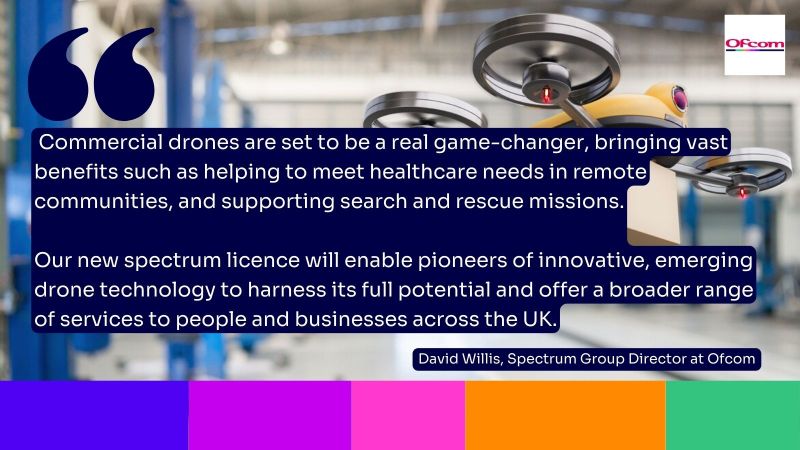The UK’s communications regulator Ofcom has released new spectrum licences for essential drone safety and communications equipment to support innovative use of commercial drones. From 20 January 2023, companies will be able to apply for a new spectrum licence allowing them to use mobile and satellite networks to operate drones over longer distances.
Ofcom worked closely with the Civil Aviation Authority (CAA), Department for Business, Energy and Industrial Strategy (BEIS), Department for Transport (DfT), Department for Digital, Culture, Media and Sport (DCMS), to enable drone operators to access more commercial opportunities.
Advances in technology have led to drones increasing in size and complexity, and flying over longer distances – in some cases travelling beyond the sight of the operator. This has created a range of commercial opportunities across several industries, from delivery of medical supplies to remote areas, to use in search and rescue operations. But long-distance, higher-altitude drones still need to be controlled and send back data or video to the operator.
As the regulator of the radio spectrum, Ofcom currently allows drones to use airwaves designated for model aircraft or for Wi-Fi without the need for a licence. This arrangement is unsuitable for the services offered by the latest generation of drones, because the radio power limitations of licence-exempt drones cannot provide the necessary range.
The launch of the new licensing regime will allow licensed operators – which could be a company or individual – to use certain on-board communications technologies for the first time which enable a drone to be operated beyond visual line of sight. These include mobile and satellite terminals for control and transmission of data and safety equipment to enable commercial drones to avoid collisions and integrate safely into the UK’s airspace.
Once granted, a new licence will last indefinitely, subject to an annual fee of GBP75. The licence covers all drones operated in the UK and territorial waters, but not international flights.
Under the terms of their new licence, drone operators must secure specific written agreement from a mobile or satellite network operator before using its network. Licensees are also prohibited from using the 2.6 GHz band (2500-2690 MHz) in order to protect air traffic control radars.
Ofcom’s new licences also authorise the use of safety equipment, including radars, beacons and altimeters, to enable drones to operate safely in UK airspace.
Along with the Government, the CAA is currently developing a longer-term framework for how drones can be integrated into UK airspace management. As part of this, it is likely that the CAA will introduce further requirements relating to what safety radio equipment drone operators must use.
Noe: The new licence does not replace the current licence exemption regime for low power 2.4 GHz and 5 GHz equipment which most drones on the market use today. Owners of these drones will not need to obtain one of these licences provided that the equipment meets the conditions for licence exempt use.
For more information visit:




